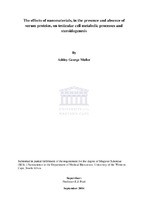| dc.contributor.advisor | Pool, Edmund J. | |
| dc.contributor.author | Muller, Ashley George | |
| dc.date.accessioned | 2015-05-19T10:17:19Z | |
| dc.date.available | 2015-05-19T10:17:19Z | |
| dc.date.issued | 2014 | |
| dc.identifier.uri | http://hdl.handle.net/11394/4143 | |
| dc.description | Magister Scientiae (Medical Bioscience) - MSc(MBS) | en_US |
| dc.description.abstract | The aim of this study is to be the first to ascertain the effects of silver nanoparticles on testosterone production. The Ag NPs used for this study have the following characteristics; purity ≥ 99.5%; 66.7 % of particles have a diameter between 20-40 nm in aqueous solution. Three month old male Balb/C mice were sacrificed and testicular cell cultures were prepared. The cells were subsequently treated with various concentrations of Ag NPs (with or without luteinizing hormone (LH)-treatment) and incubated for 4 hours. Testosterone secretion in the culture supernantant was then determined using a testosterone ELISA kit. Ag NPs (at 20 μg/ml) significantly (p < 0.001) decreased LH-stimulated testosterone production as compared to the control. This study showed that Ag NPs adversely affect testosterone synthesis in vitro and can therefore pose a risk for male reproduction. | en_US |
| dc.language.iso | en | en_US |
| dc.publisher | University of the Western Cape | en_US |
| dc.subject | Nanomaterials | en_US |
| dc.subject | Serum proteins | en_US |
| dc.subject | Silver nanoparticles | en_US |
| dc.subject | Testosterone | en_US |
| dc.title | The effects of nanomaterials, in the presence and absence of serum proteins, on testicular cell metabolic processes and steroidogenesis | en_US |
| dc.type | Thesis | en_US |
| dc.rights.holder | University of the Western Cape | en_US |

